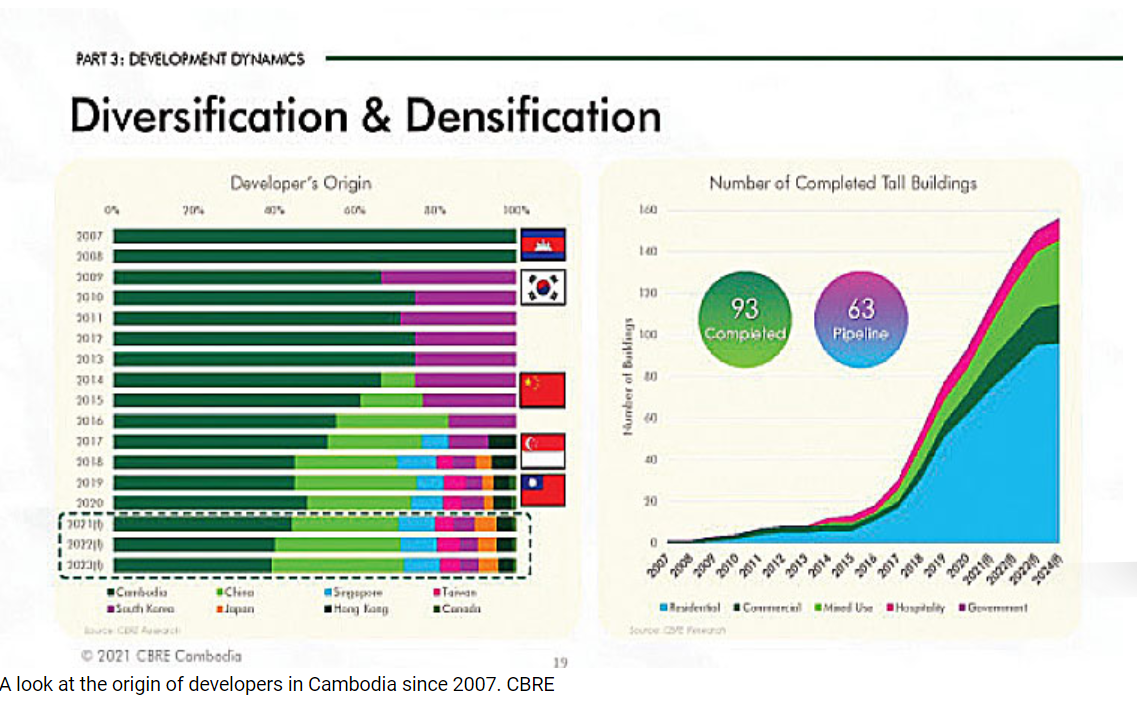Cambodia: Real estate investments looking up
The real estate investment climate looks bright post-COVID for Cambodia despite fierce competition in some sectors and an oversupply of office space, according to real estate agency CBRE managing director James Hodge.
Hodge recently hosted a webinar alongside Jay Cohen, the director of law firm Tilleke & Gibbons’ Phnom Penh branch and the two discussed different avenues for investors hoping to make an impact in the Kingdom.
Hodge said although Cambodia lags behind some of its neighbours in the level of development, the strong GDP growth the country experienced before the pandemic should resume once the dust settles.
He said the tried-and-true practice of buying land and developing on it is still viable for larger investors, but the dynamics of the market are changing, leading to opportunities in other areas.
As Cohen explained in detail, the ground-up approach is usually conducted by securing land with a Cambodian partner and creating a land holding company before establishing another company to develop the land. This is because foreigners cannot own land outright in the Kingdom.
Looking outside the normal investment channels, opportunities exist in less crowded sectors than condominiums, offices and retail spaces. Hospitals, schools and industrial and logistics projects offer less competitive clutter.
“The pandemic has created more demand particularly for health care and for education domestically,” he said.
He also mentioned retirement housing, data centres and potentially student housing in the future as possible sectors to invest in.
As a symbol of Cambodia’s capacity to develop rapidly, Hodge pointed to Sihanoukville, which was transformed from a quiet tourist town and fishing village to a gaming hub and modernistic city in a short time.
“Whilst this is an extreme example, it’s a good indicator of quite a lot of the things that we’re seeing in Cambodia and in particular how Cambodia is gearing itself up for resurgent growth after the Covid-19 pandemic recedes,” he said.
The infrastructure in Sihanoukville is equipped with smart technology which can monitor traffic and crime data and he said this may be replicated in new developments throughout Cambodia.
“If the Kingdom can introduce this kind of smart infrastructure as a first step rather than going through the usual development path then potentially the capacity and resilience of that infrastructure can be much better than we might have seen and it can help Cambodia to grow even quicker,” he said.
Infrastructure upgrades throughout the Kingdom are apparent, he added, such as road upgrades and expressway routes connecting major points of interest, such as between Phnom Penh, Sihanoukville and Ho Chi Minh City.
He also mentioned the rapid development of the third ring round around Phnom Penh as an example of development priorities taking place outside the city, as city land prices rise and developers seek more affordable options with a clearer path to solid returns.
As the customer base for recent development shifts from international customers to domestic buyers, affordable housing developments have experienced a rise in demand.
Investors have two paths to choose, he said, by investing in affordable developments on the city outskirts, or pinning hopes on an increased demand for high-rise luxury units in the city once the economy recovers from the pandemic.
Hodge also expects there to be a window for opportunistic investors to take over incomplete projects hampered by a lack of funding.
Other factors affecting the real estate environment include de-dollarisation – a practice which could benefit investors if the riel can retain strong value – and the lack of institutional investors like Blackrock in the country – an absence which allows plenty of room for small and mid-scale investors.
The ongoing crisis in Myanmar has also caused developers to look elsewhere after their prospects were erased when the country spiralled into turmoil.
He said mitigating risk is important when considering investing in Cambodia and this can be done by having clear investment and operational models and ensuring a stable source of cash flow.
In the retail sector, Hodge said the market doesn’t need more development, rather it needs operational changes and diversification to better take advantage of the market.
For those looking for assets to buy, Hodge recommended looking into the hotel and condominium sectors. In the condo sector, he said buyers can expect 20 to 30 percent discounts with softer lending terms.
Source: https://www.khmertimeskh.com/50841583/real-estate-investments-looking-up/


 English
English




